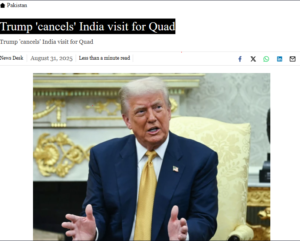
Trump Cancels India Visit for Quad Summit: A Geopolitical Turning Point
Introduction
The news of U.S. President Donald Trump canceling his scheduled visit to India for the upcoming Quad Summit has sent shockwaves across diplomatic circles. The Quad—comprising the United States, India, Japan, and Australia—was envisioned as a strategic coalition to counterbalance China’s growing influence in the Indo-Pacific. Trump’s withdrawal not only reflects a sharp downturn in U.S.–India relations but also casts uncertainty on the very future of the Quad itself.
This development must be understood in the broader backdrop of intensifying trade wars, clashing diplomatic narratives, and shifting global alliances.
Backdrop of U.S.–India Relations
The United States and India have, for decades, nurtured a steadily deepening relationship, especially since the early 2000s. Cooperation in defense, technology, energy, and trade had made the partnership a cornerstone of American policy in South Asia. However, recent months have witnessed a steady erosion of goodwill:
-
Trade Wars and Tariffs: The Trump administration imposed steep tariffs on Indian goods, citing unfair trade practices and India’s continued imports of discounted Russian oil. India retaliated with counter-tariffs, escalating the friction. These measures hurt industries ranging from agriculture to technology, creating an atmosphere of mistrust.
-
Diplomatic Missteps: Trump publicly claimed to have mediated a ceasefire between India and Pakistan during a recent border escalation. India categorically denied this, insisting that it resolved the matter independently. This claim was viewed in New Delhi as an overreach and an affront to India’s sovereignty.
-
Personal Friction Between Leaders: Relations took a more personal turn when Trump reportedly suggested that Prime Minister Modi nominate him for the Nobel Peace Prize. Modi’s refusal deepened the chill, exposing how personality politics can exacerbate state-level disagreements.
Why the Quad Matters
The Quad is more than a symbolic gathering. It represents:
-
A strategic counterbalance to China in the Indo-Pacific.
-
A platform for cooperation in maritime security, technology, climate change, and economic connectivity.
-
A signal of alignment among major democracies with shared interests in safeguarding regional stability.
Trump’s absence from the Summit risks weakening this alliance at a time when unity is crucial. Without visible U.S. leadership, the Quad could appear fragmented and less capable of presenting a unified front.
Implications of Trump’s Cancellation
1. For the Quad
-
Loss of Cohesion: The absence of the U.S. President from a major summit undermines the group’s credibility. Japan and Australia may continue cooperating with India, but the “Quad spirit” depends heavily on Washington’s engagement.
-
Opportunity for China: Beijing is likely to exploit this disunity, strengthening its own influence in Southeast Asia and presenting itself as a more reliable partner to countries wary of U.S. unpredictability.
2. For U.S.–India Relations
-
Strategic Distrust: India now views Washington as a less dependable partner. Tariffs and diplomatic overreach have already created unease, and Trump’s cancellation further cements doubts about American commitment.
-
Shift in Alliances: India is expected to diversify its partnerships, looking more closely at Russia, Japan, ASEAN nations, and even exploring pragmatic channels with China to safeguard its strategic autonomy.
3. For Regional Politics
-
Pakistan Factor: Trump’s comments on mediating an India–Pakistan ceasefire highlight how regional dynamics remain sensitive. Any miscalculation risks alienating India while emboldening Pakistan diplomatically.
-
Indo-Pacific Security: Without the Quad presenting a united front, maritime issues in the South China Sea and Indian Ocean may tilt further in China’s favor.
India’s Strategic Response
India’s approach is likely to revolve around multi-alignment rather than exclusive dependence on any single partner. Possible moves include:
-
Strengthening ties with Japan and Australia to keep the Quad functional, even in Trump’s absence.
-
Deepening cooperation with Russia in defense and energy sectors.
-
Pursuing self-reliance through its “Make in India” initiative to reduce vulnerability to trade shocks.
-
Exploring pragmatic engagement with China to reduce friction while protecting its national interests.
Global Consequences
Trump’s cancellation reverberates beyond South Asia:
-
For the U.S.: It signals inconsistency in foreign policy, raising doubts among allies worldwide about America’s reliability.
-
For China: It provides diplomatic breathing space, allowing Beijing to push ahead with its Belt and Road Initiative (BRI) and regional influence-building.
-
For Multilateralism: It highlights the fragility of informal alliances like the Quad, which rely on trust, shared goals, and consistent leadership.
Looking Ahead
The cancellation raises pressing questions:
-
Will the Quad Summit be postponed, or will India, Japan, and Australia carry on without U.S. leadership?
-
Can Washington and New Delhi repair ties before the rift deepens into a strategic realignment?
-
How will China and Pakistan exploit the fallout to advance their own interests?
Conclusion
Trump’s decision to cancel his India visit is more than a diplomatic snub—it reflects deeper tensions in the U.S.–India relationship and poses a challenge to the Quad’s future. At a time when global power balances are shifting, trust and cohesion among like-minded democracies are essential. For India, this moment may serve as both a warning and an opportunity: a warning that overdependence on any single ally can be risky, and an opportunity to assert a more independent, multipolar role in global affairs.
The cancellation marks a turning point, and how India, the U.S., and other Quad partners navigate this turbulence will determine whether the Quad emerges as a durable strategic alliance—or falters under the weight of internal contradictions.

